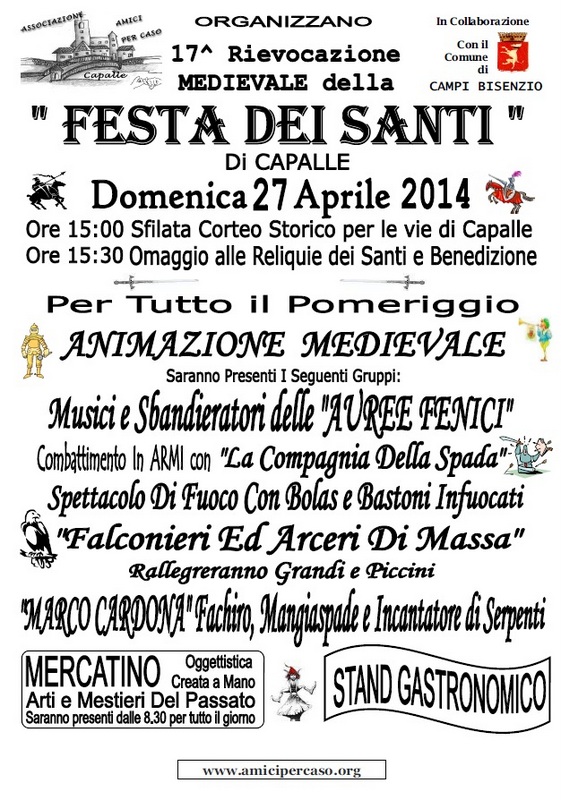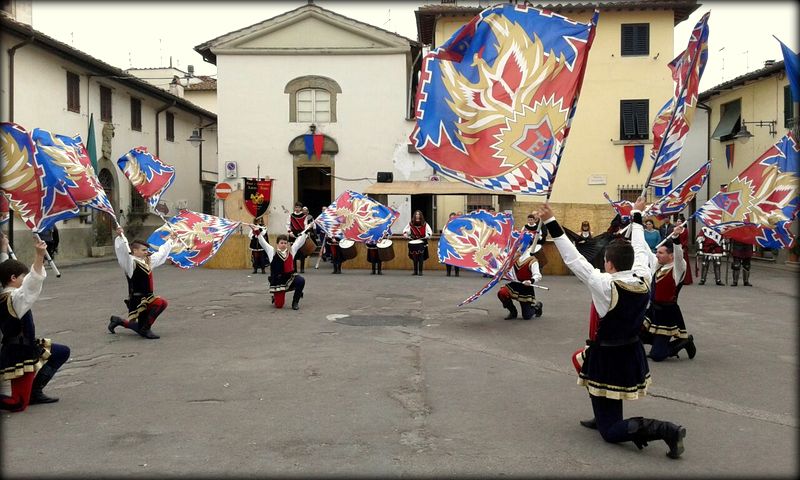La Festa dei Santi–Part 2: Grammatical Notes Posted by Serena on Apr 30, 2015 in Grammar
How did you get on with yesterday’s article, La Festa dei Santi? Hope you didn’t find it too complicated. Whilst I was reading through it and highlighting some of the vocabulary for the footnotes, I also picked out a few grammatical points that I felt it would be worth discussing. Below you’ll find short excerpts taken from each of the three paragraphs of the original article, with grammatical notes explaining the sections highlighted in blue.
Paragraph 1.
Quest’anno siamo stati invitati
… i Capallesi organizzano la Festa dei Santi di Capalle, durante la quale le reliquie dei tre santi martiri vengono esposte ai fedeli.
Grammatical Notes:
siamo stati invitati = we were invited. Passive form of the passato prossimo (present perfect) of the verb invitare (to invite). N.B. in the passive form both past participles must agree in gender and number with the person who’s doing the action, e.g. Laura è stata invitata (fem. sing. Laura was invited); Mario e Giorgio sono stati invitati (masc. plural. Mario and Giorgio were invited)
durante la quale = during which. In this case la quale refers to la festa, feminine singular. The article must agree in gender and number with the noun it refers to, i.e.: il quale, la quale, i quali, le quali, e.g. Ho incontrato Giorgio, il quale mi ha detto … (I met Giorgio, who told me …); Queste sono Laura e Luisa con le quali la settimana prossima andrò a Roma (These are Laura and Luisa with whom I’ll go to Rome next week). N.B. I did not use durante cui (during which) because it sounds ‘ugly’. To find out more read this post: Che or il Quale?
vengono esposte = are displayed. In the passive form the verb venire (to come) is often used instead of the verb essere (to be). The use of venire avoids ambiguity, and gives a sense of an action taking place. Hence, whereas le reliquie sono esposte in chiesa could either mean ‘the relics are on display in the church’, or ‘the relics are put on display in the church’, le reliquie vengono esposte in chiesa can only mean ‘the relics are put on display in the church’.
Paragraph 2.
… siamo partiti da Pontremoli la mattina presto …
… e persino la legna per fare il fuoco.
… abbiamo dovuto portare tutte queste cose dall’autobus fino in piazza …
Grammatical Notes:
la mattina presto = early in the morning. We use the adverb presto with mattina and pomeriggio in the idiomatic expressions la mattina presto = early in the morning, and il pomeriggio presto = early in the afternoon.
la legna per fare il fuoco = the wood for lighting the fire. La legna (feminine singular) is only used to mean wood used as fuel, e.g. tagliare la legna per l’inverno (to cut the wood for the winter); una stufa a legna (a wood burning stove). Il legno (masculine) is used to indicate the material used for construction, e.g. un tavolo di legno (a table made out of wood); un intarsio fatto con legni pregiati (an inlay made with precious woods)
abbiamo dovuto portare = we had to carry. For an in depth explanation of the use of the modal verb dovere see this article: Modal Verbs: Volere, Dovere and Potere
Paragraph 3.
Arrivati nella piazza vicino alla chiesa …
… ci siamo messi al lavoro a spiegare e dimostrare ai numerosi turisti i mestieri di un tempo.
Ma prima che la festa raggiungesse il suo culmine …
Grammatical Notes:
Arrivati nella piazza = Having arrived in the square. This is an abbreviated form of dopo essere arrivati or appena arrivati, and changes number and gender accordingly, e.g. arrivato a casa, Geoff si è fatto una tazza di tè = having arrived home, Geoff made himself a cup of tea.
ci siamo messi al lavoro = we set to work (literally: we put ourselves to work). Passato prossimo, first person plural of the reflexive verb mettersi (to put oneself). Mettersi al lavoro means to set/get to work, e.g. mi metto subito al lavoro (I’ll get to work immediately); fatto colazione Laura si è messa al lavoro senza indugi (having had her breakfast, Laura set to work without hesitation)
prima che la festa raggiungesse = before the festival reached …. Raggiungesse is the imperfect subjunctive, third person singular, of the verb raggiungere (to reach). The construction prima che is always followed by the subjunctive, e.g. ritorniamo a casa prima che cominci a piovere (let’s go back home before it starts raining); Laura è tornata a casa prima che cominciasse a piovere (Laura got back home before it started raining).
If you need any further help, please leave a comment.

Build vocabulary, practice pronunciation, and more with Transparent Language Online. Available anytime, anywhere, on any device.






Comments:
Allan Mahnke:
Most helpful!! Thank you!
Vito P.:
I love this posting! Questo e il mio promesso: quanto vengo a Pontremoli, vi compro un bel gelato.
Here’s my question, re: siamo stati invitati
“E arrivata una lettera! Siamo stati invitati al compleanno di Luigi.”
Isn’t this more present progressive or something? In the sense of, “we have been invited (by someone)” meaning “we are invited” to a future event.
Your blog is WAY too much fun.
Thanks,
Vp
Serena:
@Vito P. Salve Vito, sono contenta che questo post ti sia stato utile e grazie per l’invito che è ben accetto!
Risposta: ho avuto la stessa discussione con mio marito Geoff: in questi due casi (passato passato e passato ma per un evento futuro) in italiano non facciamo distinzione, in entrambi i casi usiamo ‘siamo stati invitati’ (forse perché l’invito è stato fatto, quindi è un’azione passata).
Saluti da Serena